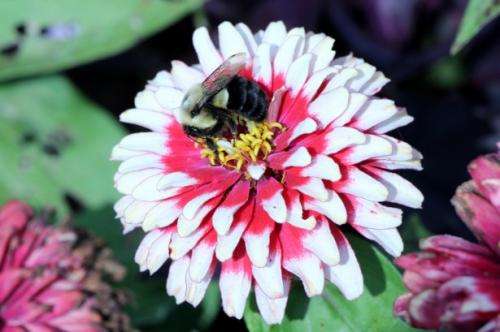Bee flower choices altered by exposure to pesticides

Scientists have shown that low levels of pesticides can impact the foraging behaviour of bumblebees on wild flowers, changing their floral preferences and hindering their ability to learn the skills needed to extract nectar and pollen.
The study, published today in Functional Ecology, is the first to explore how pesticides may impact the ability of bumblebees to forage from common wild flowers that have complex shapes such as white clover and bird's foot trefoil.
Bees and other insects pollinate many of the world's important food crops and wild plants, and have been threatened in recent years. As such, there is an increasing need for field-realistic research into the impact of pesticides on bumblebees and other wild pollinators.
In the study, bumblebees exposed to a realistic level of a neonicotinoid insecticide (thiamethoxam) collected more pollen but took longer to do so than control bees.
Pesticide-exposed bees also chose to forage from a different flower in comparison to control bees.
Professor Nigel Raine, University of Guelph (Canada), said: "Bees rely on learning to locate flowers, track their profitability and work-out how best to efficiently extract nectar and pollen. If exposure to low levels of pesticide affects their ability to learn, bees may struggle to collect food and impair the essential pollination services they provide to both crops and wild plants."
Previous studies have found that exposure to neonicotinoid pesticides can cause changes in the brain, more specifically in the areas associated with learning and memory in honeybees.
In this new study, the researchers found that, while bumblebees exposed to pesticides collected more pollen than control bees, control bees were able to learn how to manipulate these complex flowers after fewer visits.
Dr Dara Stanley, Royal Holloway University of London, lead author of the study, said: "Bumblebees exposed to pesticide initially foraged faster and collected more pollen. However unexposed (control) bees may be investing more time and energy in learning. Our findings have important implications for society and the economy as pollinating insects are vital to support agriculture and wild plant biodiversity."
"Our results suggest that current levels of pesticide-exposure could be significantly affecting how bees are interacting with wild-plants, and impairing the crucial pollination services they provide that support healthy ecosystem function," Raine added.
More information: Dara A. Stanley & Nigel E. Raine (2016) Chronic exposure to a neonicotinoid pesticide alters the interactions between bumblebees and wild plants. Functional Ecology DOI: 10.1111/1365-2435.12644
Journal information: Functional Ecology



















